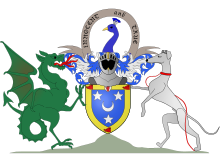Wyvern

Wyvern ( / ˈwaɪvərn /, / ˈwɪvərn / , more rarely also Wivern ) is the name for a type of representation of heraldic dragons in the English-speaking world .
Unlike other dragons in heraldry, wyverns have two legs, wings, and a serpentine rump that is spiked. In a figurative sense, the word is used for any pictorial or figurative depiction of dragons that is modeled on the heraldic dragon.
etymology
The word wyvern has been proven to mean "two-footed dragon with wings" since the 17th century, it comes from the Middle English wyvere , wyver (13th century), which itself is derived from the old French wivre (French guivre and vouivre ). The old French word comes from the Latin vipera (viper). The “V” has evolved into “W” due to the Old Low Franconian influence on Old French (→ Old High German wipera ).
Representation in modern fantasy
In addition, Wyvern is used as a generic or species name for dragons in fantasy literature and films as well as in computer and pen & paper role-playing games. If authors want a distinction from intelligent and / or magical dragon beings, wyverns are often described as animals that are not intelligent and smaller than dragons. For example, they lack typical kite attributes such as flight ability or spitting fire, but they are occasionally assigned a dangerous tail sting. Details in appearance and behavior vary depending on the fantasy author or game.
- see also: Lindwurm , Tatzelwurm
Web links
Individual evidence
- ↑ TF Hoad (ed.): The Concise Oxford Dictionary of English Etymology. Oxford University Press, Oxford et al. 1993, ISBN 0-19-283098-8 , p. 546.
- ↑ Site du Center National de Ressources Textuelles et Lexicales: Origin of vouivre (fr)
- ↑ Site du Center National de Ressources Textuelles et Lexicales: Origin of guivre (French)

